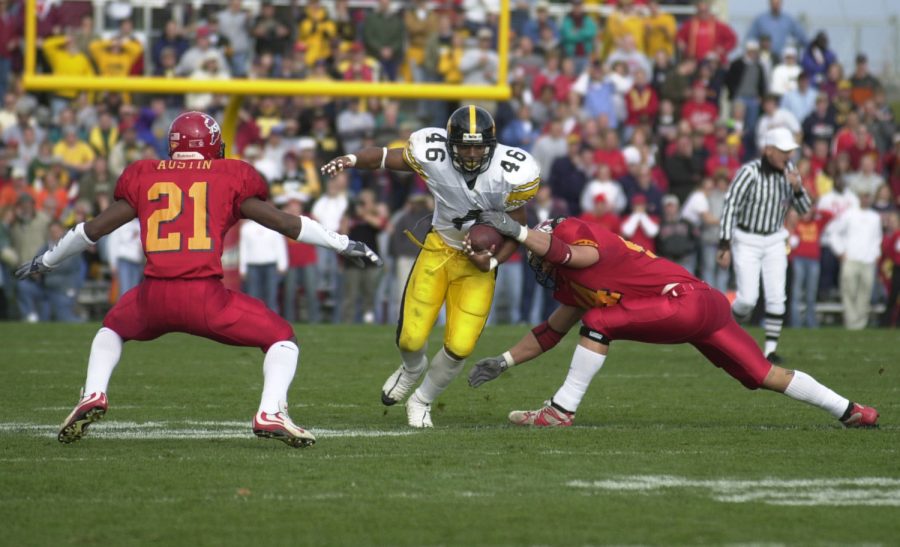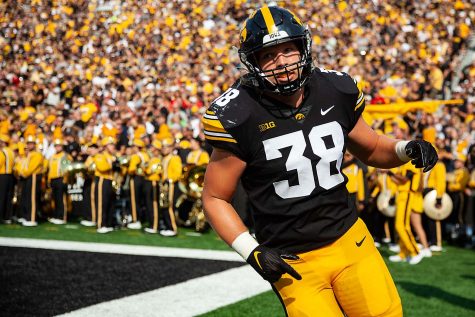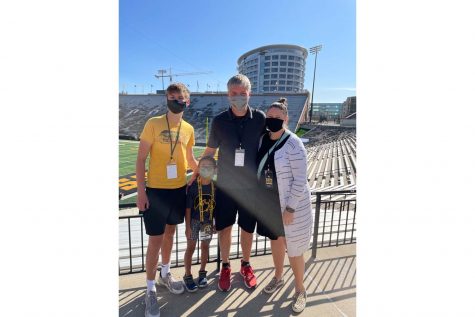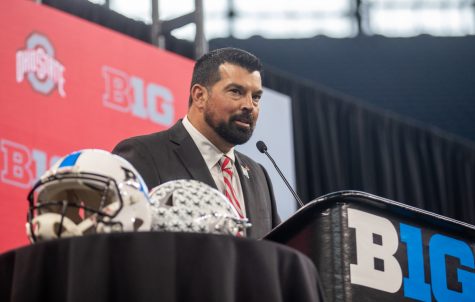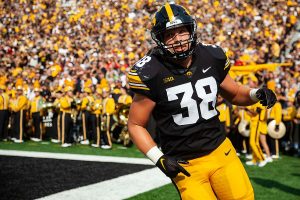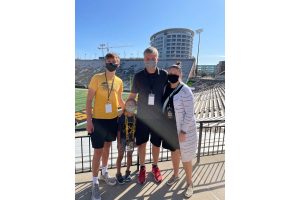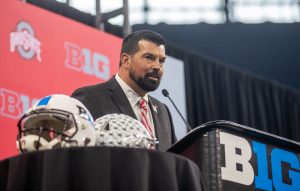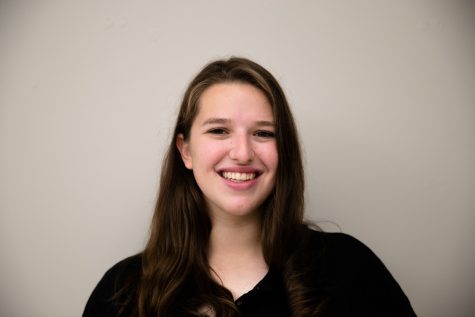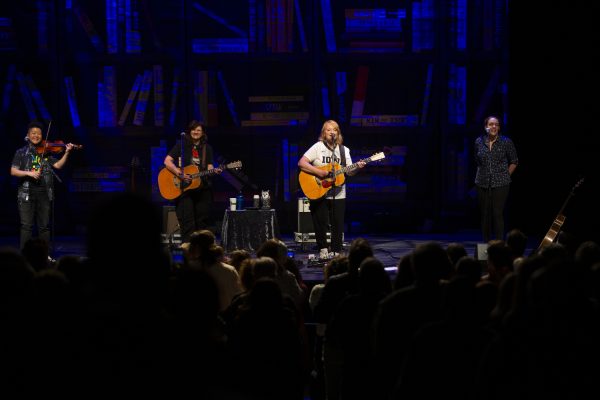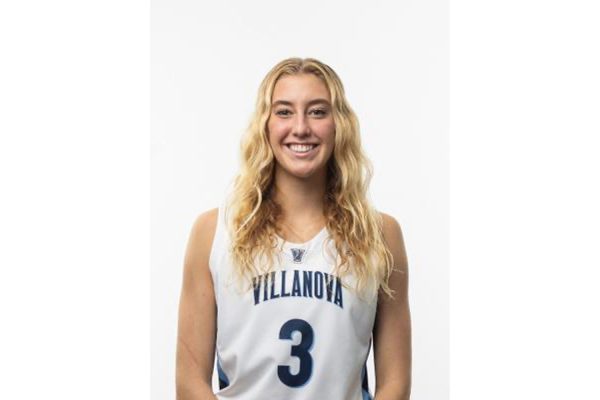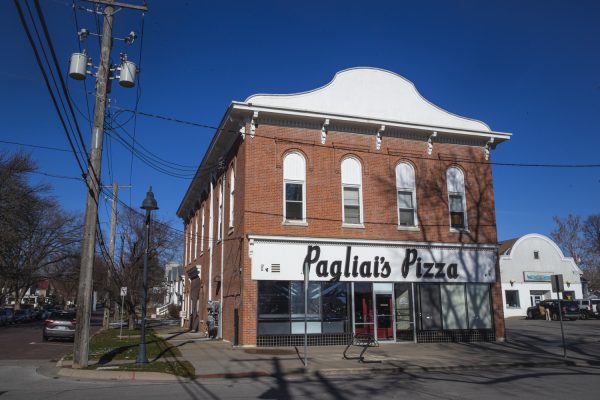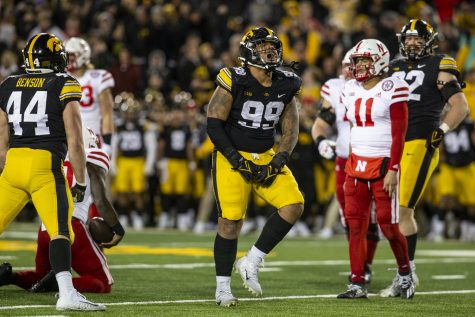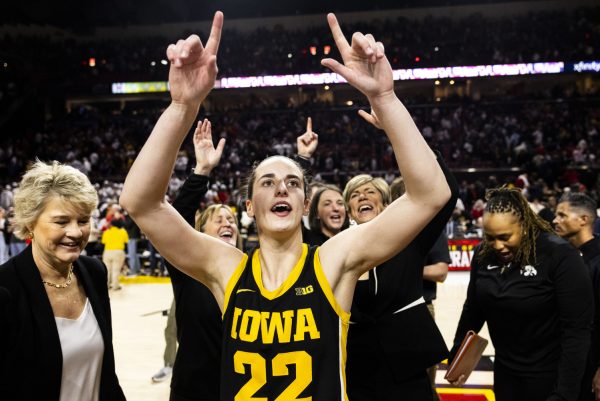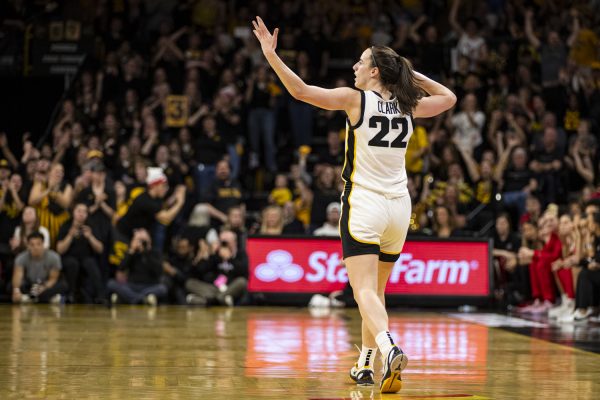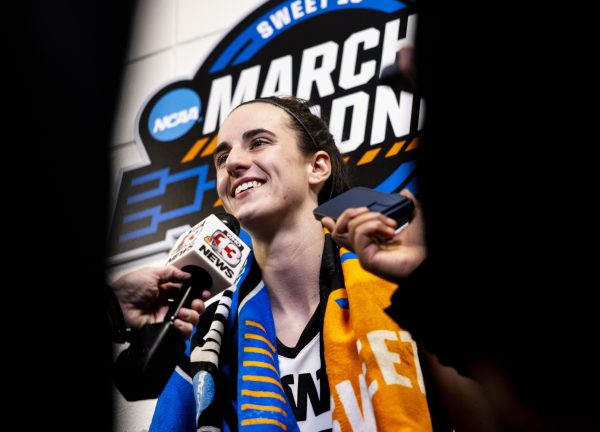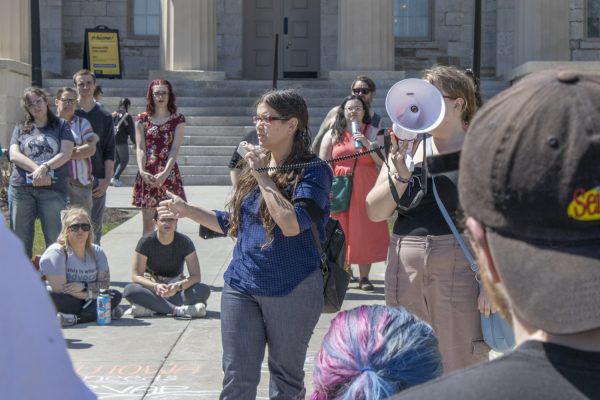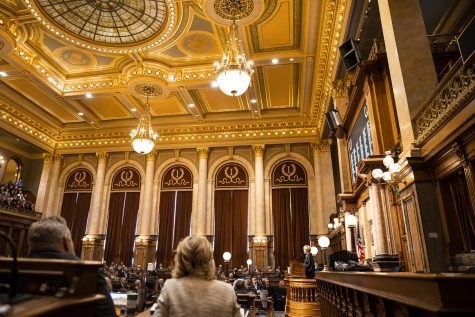Former Hawkeyes remember how 9/11 disrupted Iowa football
After planes struck the twin towers in New York City on Sept. 11, 2001, all sports, including Hawkeye football, stalled.
Ladell Betts rushes against Iowa State at Jack Trice Stadium Saturday afternoon on Nov. 24, 2001.
September 9, 2021
On Sept. 11, 2001, the Iowa football team was preparing for its annual Cy-Hawk matchup against Iowa State, scheduled for four days later.
That is, until American life was turned upside down.
Former Hawkeye tight end Dallas Clark, who played for Iowa from 1999-2002, had just finished his lifting regimen when he realized the North Tower of the Word Trade Center had been hit.
“We had small TVs in the locker room, and I remember walking around the corner and that was on, for some reason,” Clark said. “Those TVs were hardly ever on. And so, I just remember like seeing it, and just, I think at that time just one tower had been hit. And I just couldn’t even grasp what I was seeing.”
Clark’s teammate, former Hawkeye safety Sean Considine, was not in the weight room rotation that morning. Instead, Considine and his roommate, former Hawkeye punter Dave Bradley, witnessed the events from their dorm room that Tuesday morning.
And it was something Considine will never forget from his college experience.
“I want to say it was around 9 a.m. or 9:30 in the morning,” Considine said. “We actually turned the TV on and started seeing what was going on, and watched one of the planes flying to the towers and it was just, it was unbelievable. You know, I don’t remember a lot of things from back in that time period, like specific events like that, but I’ll never forget standing in that room, in that dorm room that day, watching that transpire and wondering what the heck was going on.”
During the football season, Ferentz typically holds a press conference every Tuesday afternoon.
Former Daily Iowan Sports Editor Todd Brommelkamp, who covered the 2001 Hawkeye team, was preparing for the weekly conference that morning. Despite the attacks, Brommelkamp headed to the press conference scheduled for that afternoon.
“I had Kirk’s news conference that day,” Brommelkamp said. “And nobody really knew — that was before social media … Email was not even at the forefront of people’s minds on how to communicate. So, I remember taking the Cambus over [to the press conference.]”
But on that Tuesday, the press conference was canceled. So, Brommelkamp went back to the DI newsroom, waiting for answers.
Ferentz watched the attacks from former Hawkeye video editor Matt Englebert’s office on Tuesday morning. At the time, Ferentz said, it was surreal. What was more surreal, he added, is that the Hawkeyes still practiced that afternoon. As far as Iowa knew, it still had a game that Saturday.
“I don’t know how many people felt like this, but I know at this point now that I really didn’t grasp, fully grasp, what was taking place on the impact of that whole thing,” Ferentz said. “… But the magnitude of what took place, however old I was at that point 20 years ago, I’m not sure I grasped it totally, and how it’s all changed all of our lives, not to mention just the tragedy of the whole thing and all the loss.”
U.S. air space was closed for two days following the Sept. 11 attacks. The only planes authorized to fly were U.S. military crafts, including Air Force One housing former President George W. Bush.
Before airports and airlines resumed operations that Thursday, the Hawkeyes were practicing when Considine saw a plane in the sky.
“At some point that week, we got back to work as best as we could,” Considine said. “If I remember right, we had an airplane flying over practice that day. And we’re all thinking it was probably Air Force One with the president, because as far as we know there was nobody else supposed to fly.”
Despite the airspace reopening, Iowa’s annual Cy-Hawk matchup against Iowa State was postponed to the end of the season that Thursday.
For Clark, it put into perspective the magnitude of the World Trade Center attacks.
“At that time you realize, like, holy cow this is huge,” Clark said. “Obviously a college game didn’t really mean that much compared to what was happening to our country.”
“I mean, it just changed life in general,” Clark added. “It changed travel, it changed just people’s awareness of things, and all that, I mean it just changed life. Obviously, that sprinkled into the NFL and college and all that stuff, but I mean, I think it’s bigger than a change there. I mean, it just rocked our world that week.”
It was an unusual weekend for Hawkeye football media members, and sports reporters around the country, with no college football, NFL, or Major League Baseball.
“It was just, it was very strange. It was college football, baseball, everything stopped,” Brommelkamp said. “And we didn’t really know how long things were going to be stopped for. There wasn’t gonna be an Iowa-Iowa State game, but what about the next week, and the week after that, and how long were things going to be sort of in this holding pattern.”
One week later, sports returned to a small sense of normalcy. Baseball restarted on Sept. 17, and Hawkeye football returned with a 24-18 victory over Penn State on Sept. 29.
But everything wasn’t back to how it was before the New York City attacks — nor would it ever be again.
For the rest of the 2001 football season, Brommelkamp remembers increased tensions and security measures as he traveled to Hawkeye games.
“I remember, very vividly, Iowa played at Michigan State that year,” Brommelkamp said. “And I remember pulling up in front of the hotel. The hotel we stayed at was the same hotel that Iowa [football] did. And I remember they had police out front, a bomb sniffing dog, and there was, there had been a rental car that was parked out front that no one knew it belonged to. And they were checking to make sure that it wasn’t some threat.”
The Cy-Hawk matchup was postponed to the end of the 2001 football season, leading to a unique matchup between Iowa and Iowa State — one with bowl implications.
RELATED: Iowa, Iowa State in national spotlight with top-10 Cy-Hawk football matchup
Before the final game of the 2001 regular season, the Hawkeyes were 7-4, and the Cyclones were 6-5. Both Iowa and Iowa State, Brommelkamp said, needed the win to further their bowl status.
“That was a very unique aspect of [the Cy-Hawk] game,” Brommelkamp said. “With it being the last game of the year, there was something riding on it for both teams. It had been so long in that series since that had been the case.”
Iowa State took home the Cy-Hawk trophy on Nov. 24, 2001, with a 17-14 victory at Jack Trice Stadium.
With the Cyclones’ victory, both teams ended the regular season 7-5. Iowa earned a berth in the Alamo Bowl, defeating Texas Tech, 19-16, and Iowa State lost the Independence Bowl, 14-13, to Alabama.
Twenty years later, the Hawkeyes and Cyclones will match up on the anniversary of the attacks — with student-athletes who were infants or not yet born on Sept. 11, 2001.
Before the Cy-Hawk football game this Saturday, Iowa State will recognize the 20-year anniversary at Jack Trice Stadium.
And Brommelkamp, now the host of the “Todd Brommelkamp Show” on KGYM Radio in Cedar Rapids, will find a different meaning in the highly anticipated Cy-Hawk game as he sits in the press box.
“I think a lot of people are going to reflect back on [the attacks],” Brommelkamp said. “And the fact that it is the same opponent is sort of unique and the fact that it is Iowa-Iowa State and there’s so much that goes into that game to begin with. But you do add an extra layer there that I think will lend itself to reflecting… [Ferentz] was coaching here 20 years ago and they’ve got players on a roster who weren’t born when that happened.
“A lot of us were here, a lot of us lived it, a lot of us remembered it, and a lot of us will be thinking about that probably Saturday, watching that game from the press box.”



